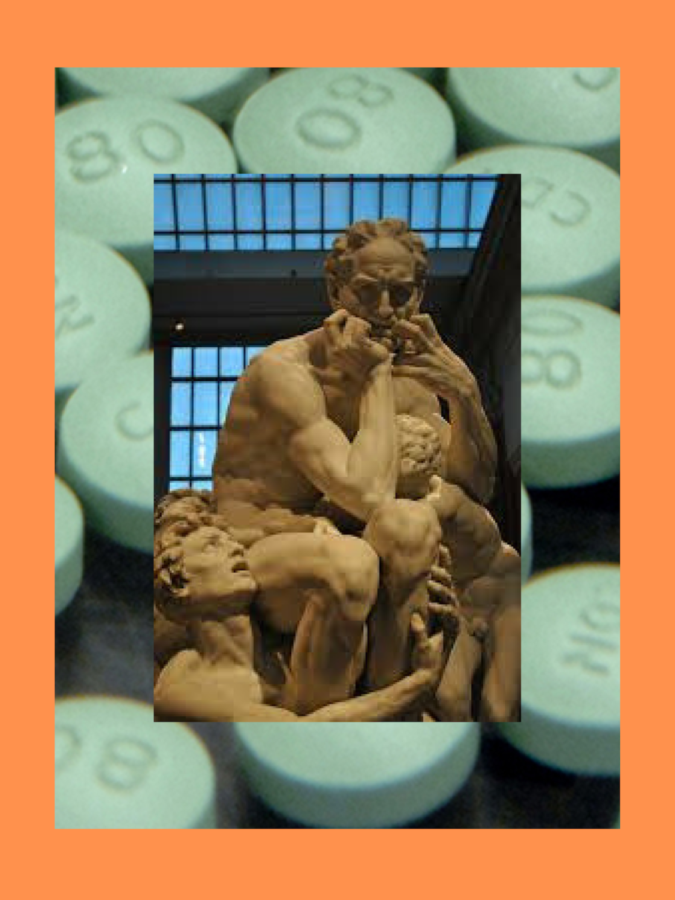The charity dilemma
Photo provided by Lauren Teller
Oxycontin, a highly addictive painkiller was first introduced to the pharmaceutical market in 1996 by Perdue Pharma, owned by the Sackler family.
April 23, 2019
Just the other day, I dared to venture into an unknown territory- FM radio. Indecisively turning the dial, switching between static and talk shows, I finally reached MPR. The first words that come out of the broadcaster’s mouth are ‘opioid crisis,’ an upset to the sweet nostalgia the steady broadcasting stream had provided me with.
The opioid crisis was just the tip of the iceberg on this particular Minnesota Public Radio program. I was introduced to the large pharmaceutical company, Purdue Pharma, owned by the extremely wealthy Sackler family. The patriarch of the clan, Raymond Sackler, invented the highly addictive pain-killer, Oxycontin, back in 1996, and has since faced scrutiny over the product’s role within the opioid crisis in North America.
The impact that the family has within not only the pharmaceutical and medical industries, but certainly society, will continue to raise questions surrounding the epidemic. Arguably yet another moral predicament surrounding the phantasm of their wealth is their philanthropic contributions. The Sackler name is synonymous with several cultural and educational institutions, both domestic and international, including but not limited to; the Guggenheim, Metropolitan, Smithsonian and Louvre Museums.
These institutions now face a dilemma – keep the money given by the now-tarnished donor or return the tainted funds. But returning the funds may be easier said than done. The Sacklers have invested large sums in establishments that are some of the most renowned institutions for the preservation and promotion of culture. Given that the museums have accepted the generous gifts, what obligation and affiliation do they have to the donor’s name and reputation? What is the moral status of money from a immoral source?
Dirty money: many of us jump to conclusions about the family and their grand scheme, acts of manipulation, etc. While the family’s donations come from their fortune, made from fueling a corrupt industry that profits off of selling addictive medication to vulnerable clients, this money is being put to use by institutions that are benefiting the greater good in some monumental ways. In 2018, the Louvre saw 10.2 million visitors come through its doors, and has become a leader within the art world, specifically for the research and preservation of many of its in-house pieces.
One member of the Sackler clan, Jillian Sackler, feels that the family has “a moral duty to make it right,” and that by donating to notable causes, they are in turn repaying their moral debts. The majority would believe that accepting this money would be wrong, and maybe just as immoral as building a fortune off of it. I would disagree, as so many other organizations have ties to corrupt acts of some sort.
It’s plain and rather not so simple, however money is money. While some non-profit institutions return the funds that they are gifted, a more moderate solution would be a compromise of sorts. Remove the surname from the list of donors and title, but choose to keep the gift in order to fund the hospital, school, or in the Sackler family’s case, museum. Of course, this depends on the degree to which the source is involved. Simply a donor, not a stakeholder or chairperson, can be removed and disassociated from the institution with ease. Funds can never completely undo or wipe dishonest deeds from the conscience of those involved, however the benefactor still leaves a positive mark on the organization, whether it was their intention from the beginning or not. On a much smaller scale, think of a time you received a gift from someone that you weren’t quite fond of. Did you deny the gift and return it to the gifter, or instead decide to keep it?
Sorry, but I’m keeping the gift. Why should I return something that was given to me? I might like the gift a lot; it could be used to help me and make my life easier in the long run. The same is true for many charities, especially if they have already used the funds within the organization. The Guggenheim is unlikely to return the funds that they dedicated to build a new exhibit, because now they are left to pay for that expense with money that was intended for another use. I have already worn the sweater that I bought with the money that my annoying, arrogant aunt had given me, therefore I am not returning it.
Each side exhibits some moral dilemmas, however, charities should serve the central purpose of aiding society. Nonprofits are gifted in order to advance their agendas with the best interest of the greater good at heart. While funds received many be products of dishonest business, philanthropic organizations shouldn’t feel particularly obliged to return funds intended for advancing such agenda.









